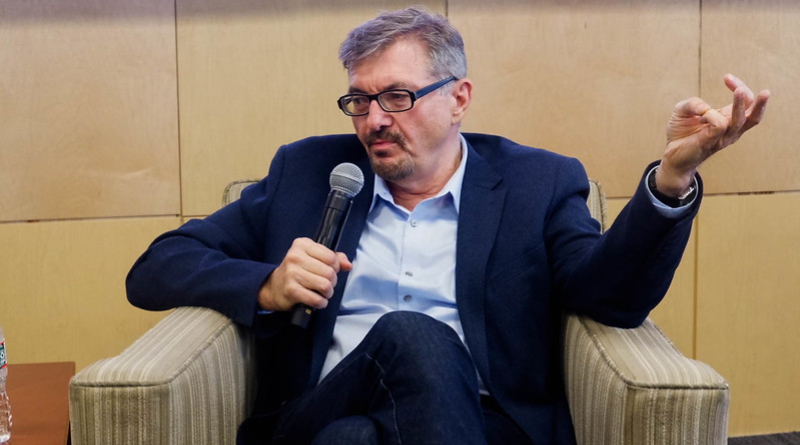Harvard prof. Serhii Plokhii traces historical path to Ukraine War
The director of the Ukrainian Research Institute at Harvard University spoke to the Fletcher School about his new book on the Russo-Ukrainian war.
By Arvind Pillai of The Tufts Daily
Serhii Plokhii, the Mykhailo S. Hrushevs’kyi professor of Ukrainian history and director of the Ukrainian Research Institute at Harvard University, spoke at the Fletcher School about his new book, “The Russo-Ukrainian War: The Return of History” on Sept. 19. Plokhii discussed the chronology of the war and his process writing the book.
“It’s quite clear already … that this is the largest industrial military conflict in Europe since World War II,” Plokhii said. “It’s also the largest in terms of the armies involved, the destruction that is happening as a result of the war, the number of refugees, the number suffering — there is nothing in Europe since 1945 to compare it to but to World War II.”
Plokhii explained that he initially had doubts about whether to write a book about history as it was unfolding.
“When I was approached by my publisher on [whether or not] I would want to write a book on the war, and that was very early on, it was March, and I said ‘Definitely not’ … for two reasons,” Plokhii said. “The first one was just emotional. You can’t comprehend what is going on. The only way I could describe what was going on is criminality. … Another reason why I said ‘no’ was that, as a historian, we are trained to deal with the issues of change and continuity.”
Plokhii originally saw the work of a historian as incompatible with reviewing contemporary events, because in his line of work, “wisdom comes from the fact that we already know the results of the game.”
As the war progressed over the last year, however, Plokhii’s stance on writing about it gradually changed.
“I can’t bring [up] an example of another war that starts with a historical essay being published a few months before the start of the all-out war, and I refer, of course, to Vladimir Putin’s ‘On The Historical Unity of Russians and Ukrainians,’” he said. “There was a narrative that was presented that was justifying, from a historical point of view, the formation of national identities, [which] I certainly considered to be a crime and still consider to be a crime … [this] was basically asking for a response, asking for a historical perspective.”
Following the release of President Putin’s essay, academics in Ukrainian and Russian studies received a sudden rush of attention.
“To my surprise, people actually kept coming back to me, and I thought, ‘Maybe there is something in historical perspective that is important,’” he said. The media attention prompted Plokhii to investigate how historical events have culminated in the war.
“I rephrased Winston Churchill, who said that democracy was the worst form of government — except every other. I turned it into ‘Historians are the worst commentators on contemporary developments, except everybody else,’” Plokhii said. “That’s what gave me some confidence in doing what I was doing.”
Plokhii argued that there is a substantial historical context beyond Putin’s misrepresentation of events. He believes that the conflict did not truly commence on Feb. 24, 2022, but rather in late February 2014, when Russia invaded Crimea. Plokhii traced the origins of the war to the collapse of the Soviet Union in the 1990s.
“The Soviet Union fell apart without global war,” Plokhii said. “It looked like the history didn’t really matter anymore … There was that feeling that Russia, as well as other republics, [could] be turned overnight into democracies … What we now know is that that didn’t happen … This war is a classic war of the disintegration of an empire.”
Despite the war, Plokhii expressed hope for the future of Ukrainian democracy.
“I’m optimistic because of European integration. I’m also optimistic because of Ukrainian history,” Plokhii said. “If some form of modern authoritarian regime emerges, that would be a break with centuries of history, and that’s certainly not what people on the frontlines want to do.”
(This post is republished from The Tufts Daily.)

